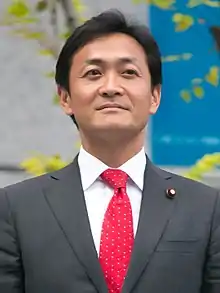Democratic Party for the People
The Democratic Party for the People[10] (国民民主党, Kokumin-minshutō); 国民党, KMT; DPFP or DPP)[11] is a centre to centre-right political party in Japan. The party was initially formed on 7 May 2018 from the merger of the Democratic Party and Kibō no Tō.[11]
Democratic Party for the People 国民民主党 or 国民党 Kokumin-minshutō or Kokumintō | |
|---|---|
 | |
| Leader | Yūichirō Tamaki |
| Deputy Leader | Kōhei Ōtsuka Motohisa Furukawa |
| Secretary-General | Hirofumi Hirano |
| Councilors Leader | Kōhei Ōtsuka |
| Founded | 7 May 2018 11 September 2020 (in current form) |
| Merger of | Kibō no Tō Democratic Party (2016) Liberal Party (2016) |
| Merged into | Constitutional Democratic Party of Japan (majority faction) |
| Headquarters | 1-11-1 Miyakezaka Building, Nagatachō, Chiyoda, Tokyo |
| Newspaper | Kokumin Minshu Press[1] |
| Ideology | Liberal conservatism[2] Popular sovereignty[2] |
| Political position | Centre[3][4][5] to centre-right[6][7] |
| Colors | Blue and Orange[8] |
| Slogan | つくろう、新しい答え。[9] (Tsukurou, atarashii kotae, "Let's make a new answer") |
| Councillors | 8 / 245 |
| Representatives | 7 / 465 |
| Website | |
| new-kokumin.jp | |
In September 2020 a majority of the party reached an agreement to merge with the Constitutional Democratic Party[12] and the original party was officially dissolved on 11 September 2020. However 14 DPFP members refused to merge, including party leader Yuichiro Tamaki, and instead formed a new party retaining the same DPFP name and branding.[13]
History
On 28 September 2017, Democratic Party (DP) leader Seiji Maehara announced that the party had abandoned plans to contest the 2017 general election,[14][15] with the party's sitting representatives contesting the election as candidates for the Kibō no Tō recently founded by former Tokyo governor Yuriko Koike, or as independents.[16] On 23 October 2017, after the election, Maehara resigned as party president, with the Constitutional Democratic Party of Japan (CDP) having replaced the DP as the largest opposition party in the House of Representatives, while the existing DP caucus continued to exist in the House of Councillors.[17][18]
In January 2018, the DP and the Kibō no Tō agreed to form a joint parliamentary group in both houses of the Diet,[19] although days later the negotiations broke down.[20] On 9 April 2018, it was announced that talks were ongoing to merge the two parties into a new opposition force.[21] On 24 April 2018, at a joint press conference the leadership of the DP and the Kibō no Tō announced that both parties had agreed to merge in May 2018 as the National Democratic Party.[22] The DP and Kibō no Tō merged to form the DPFP on 7 May 2018.[14] 62 members of the predecessor parties joined the DPFP at its formation.[23] DP leader Kōhei Ōtsuka and Kibō leader Yūichirō Tamaki became the interim co-leaders of the new party.
The party held a leadership election in September 2018 to choose a permanent leader. Interim co-leader Tamaki was elected as the permanent leader of the party.[24]
In April 2019, the Liberal Party merged into the Democratic Party for the People.[25]
Partial merger with CDP
On 19 August 2020, the DPFP announced that a majority of its members would merge in September of that year with the Constitutional Democratic Party and some independent lawmakers.[26] Both parties would officially be dissolved under the agreement. On 10 September 2020, the new party elected Yukio Edano of the CDP as its leader and voted to retain the CDP party name. The DPFP dissolved on 11 September 2020, the day after the leader of the merged party was elected.[12] However, 14 members of the DPFP, led by Tamaki, refused to merge with the CDP, instead creating a new party which retained the DPFP name and branding.[27]
Ideology
A self-proclaimed "reformist centrist" party,[2][28] it enumerated freedom, symbiosis and responsibility for the future in its basic philosophy and self-proclaimed the establishment of a "Reformist-Centrist Party" (改革中道政党, Kaikaku-chūdō seitō) based on these philosophies.[28] Otsuka said that the term "Reformist-Centrist Party" describes the attitude and spirit of the DPFP that thoroughly adheres to a democratic approach to realistically reform/solve various issues.[29] However, the party is viewed as having a strong "reformist conservative" tendency because the split of the DP has drained liberals to the CDP.[2]
The DPP officially promoted diplomatic pacifism, constitutionalism and sustainable development.[28]
Leadership
| Position | Name | Previous party |
|---|---|---|
| Leader | Yūichirō Tamaki | Kibō |
| Deputy leader | Kazuhiro Haraguchi | Democratic |
| Vice leaders | Shū Watanabe | Kibō |
| Masao Kobayashi | Democratic | |
| Secretary-General | Motohisa Furukawa | Kibō |
| Deputy Secretary-General | Teruhiko Mashiko | Democratic |
| General Affairs chief | Hirofumi Hirano | Democratic |
| Diet Affairs Committee chief | Kenta Izumi | Kibō |
| Election Campaign Committee chief | Atsushi Ōshima | Kibō |
| Policy Affairs Research Council chief | Shinya Adachi | Democratic |
| No. | Name | Term of office | Image | Election | ||
|---|---|---|---|---|---|---|
| Took office | Left office | |||||
| Preceding parties: Democratic Party (2016) (centre), Kibō no Tō (centre-right), & Liberal Party (2016) (centre-left) | ||||||
| 1 | Co-leadership Kohei Otsuka Yuichiro Tamaki |
7 May 2018 | 4 September 2018 |   |
DP; 2017 Kibō; 2017 | |
| 2 | Yuichiro Tamaki | 4 September 2018 | 11 September 2020 |  |
2018 | |
| Successor parties: Constitutional Democratic Party (centre-left) & Democratic Party for the People (centre-right) | ||||||
| 1 | Yuichiro Tamaki | 11 September 2020 | present |  |
2020 | |
References
- 機関紙「国民民主プレス」 [Newspaper "KOKUMIN MINSHU PRESS"]. dpfp.or.jp (in Japanese). 15 May 2019. Retrieved 4 June 2019.
- Yano, Takeshi. "日本大百科全書(ニッポニカ)". kotobank.jp (in Japanese). Retrieved February 29, 2020.
- Sieg, Linda (26 August 2018). "Japanese PM Abe seen headed for extended term despite policy doubts". Reuters. Retrieved 21 October 2019.
- McCurry, Justin (8 November 2018). "The changing face of Japan: labour shortage opens doors to immigrant workers". The Guardian. Retrieved 21 October 2019.
- Harding, Robin (5 November 2018). "Japan demand for labour sparks immigration debate". Financial Times. Retrieved 21 October 2019.
- "Japan". Freedom in the World. Freedom House. 2019.
- "Merger of Japan opposition parties remains elusive as DPP lawmakers balk at immediate action". The Japan Times. 21 January 2020. Retrieved 21 February 2020.
While the CDP, a center-left party, is united on the merger idea, the DPP, a center-right party, was divided even before Monday’s developments.
- 国民民主党のロゴを発表 [Announced the DPFP logotype.]. dpfp.or.jp (in Japanese). Democratic Party for the People. May 21, 2018. Retrieved November 24, 2020.
- つくろう、新しい答え。 [Let's make a new answer]. dpfp.or.jp (in Japanese). 19 December 2018. Retrieved 4 June 2019.
- Tomohiro Osaki. "Abe denies rumors he's planning to call snap election". The Japan Times. Retrieved 2 May 2018.
- Yoshida, Reiji (7 May 2018). "Rock bottom in opinion polls, Japanese opposition parties Kibo no To and Democratic Party decide to merge". Japan Times. Retrieved 7 May 2018.
- Johnston, Eric (2020-09-10). "Yukio Edano elected chief of new CDP, Japan's top opposition party". The Japan Times. Retrieved 2020-09-10.
- "Japan's opposition DPP party to split as merger talks hit impasse". The Japan Times. 12 August 2020. Retrieved 17 September 2020.
- "Japan's Party of Hope to dissolve just months after its creation". Financial Times.
- "Japan's Koike wins over more key politicians". Nikkei Asian Review.
- Yoshida, Reiji (28 September 2017). "Democratic Party effectively disbands, throwing support behind Koike's party for Lower House poll" – via Japan Times Online.
- "CDP looking for allies; Koike won't step down; Maehara to quit".
- "Shattered Democratic Party to remain, pick new leader:The Asahi Shimbun".
- Osaki, Tomohiro (15 January 2018). "Japanese opposition parties DP and Kibo no To agree to join forces" – via Japan Times Online.
- "Alliance negotiations between two Japanese opposition parties break down". 17 January 2018 – via Japan Times Online.
- "Japan's Democratic Party and Kibo no To launch merger talks". 10 April 2018 – via Japan Times Online.
- Jiji Press (25 April 2018). "DP, Kibo to merge into new party as early as May 7". Yomiuri Shimbun. Retrieved 26 April 2018.
- "New opposition party lacking in numbers after 2 parties merge". Asahi Shimbun. 7 May 2018. Retrieved 7 May 2018.
- Kawai, Tatsuro (4 September 2018). "Tamaki chosen to lead DPP; vows to confront Abe government". Asahi Shimbun. Retrieved 5 September 2018.
- "Democratic Party for the People, Japan's second-largest opposition force, absorbs Ozawa's Liberals". The Japan Times. 26 April 2019. Retrieved 22 May 2019.
- "Japan's largest opposition parties to merge in September". The Asahi Shimbun. 2020-08-20. Retrieved 2020-08-25.
- Sugiyama, Satoshi (2020-08-19). "Japan's DPP approves CDP merger as snap poll speculation grows". The Japan Times. Retrieved 2020-08-25.
- 綱領 (in Japanese). Democratic Party for the People. Retrieved 11 June 2018.
- "【大塚耕平共同代表インタビュー】 国民民主党が目指す改革中道政党とは" (Press release) (in Japanese). DPFP. 5 July 2018. Retrieved February 29, 2020.